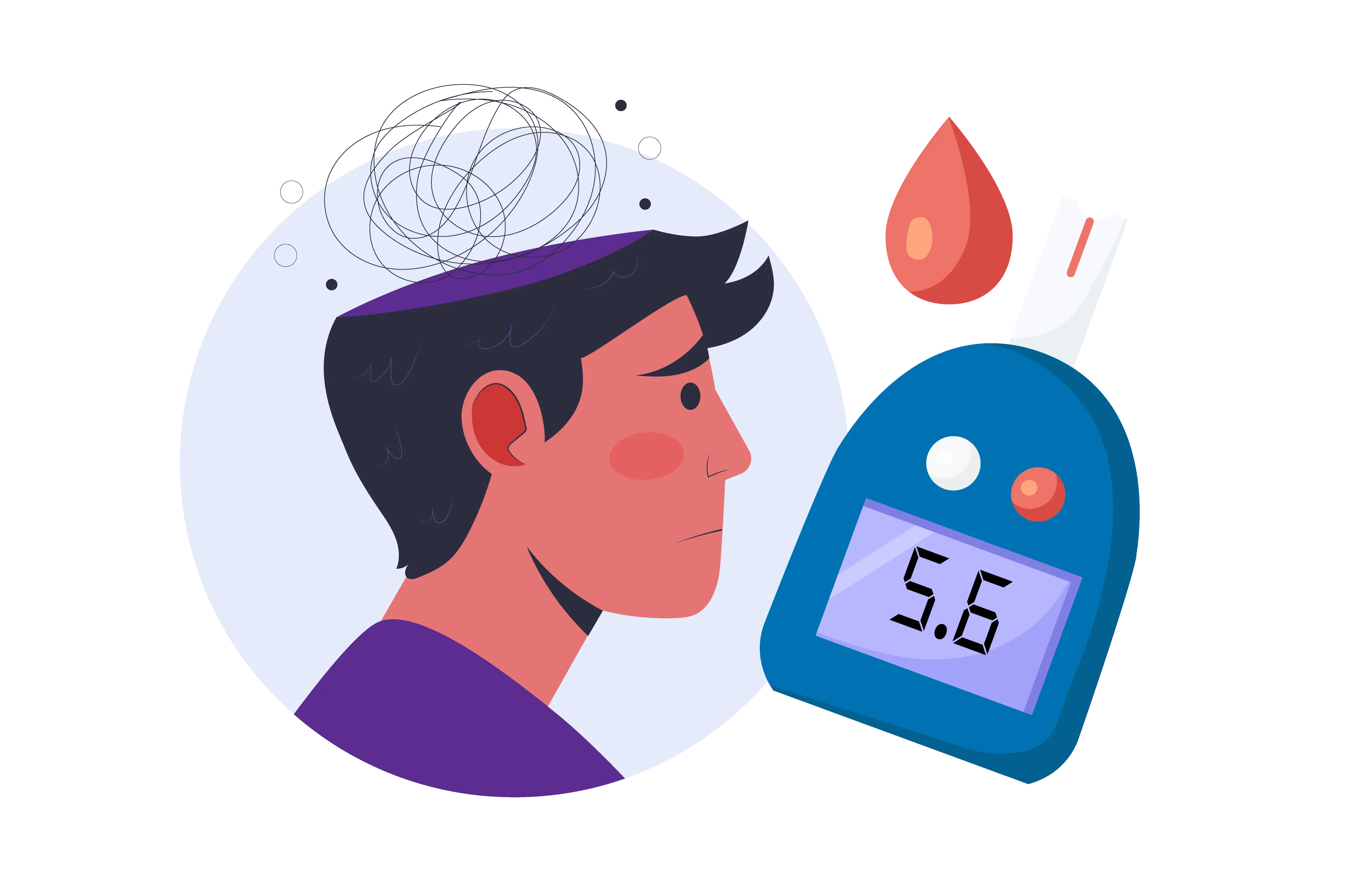Psychiatrist | 4 min read
Type 1 Diabetes and Psychological Issues: An Important Guide for You
Medically reviewed by
Table of Content
Key Takeaways
- Treatment of type 1 diabetes requires life-altering changes
- Psychological issues are twice as frequent in people with type 1 diabetes
- Extreme worry and sadness are symptoms of mental health issues
Several studies indicate that type 1 diabetes and depression are related to one another. In fact, mental health issues are twice as frequent in people with type 1 diabetes [1]. According to the Centers for Disease Control and Prevention, diabetic patients are 2 to 3 times at a higher risk of facing depression. Although psychological aspects of diabetes are curable, only 25% to 50% of diabetic patients with depression get diagnosed and treated [2]. If not treated, diabetes and psychiatric disorders can get worse.
Diagnosis of diabetes, especially type 1 diabetes, can be life-altering. It demands changes to your lifestyle that you may not be ready for. Type 1 diabetes and mental health are closely related and can affect your life and relationships. However, you can address this by being informed. Read on to learn more about psychological issues due to diabetes.
Additional Read: All you Need to Know About Type 1 Diabetes and Diet ControlHow to Identify Psychological Issues of Type 1 Diabetes
About 45% of mental health cases go undetected among diabetes patients [3]. The main challenge is for you to identify mental health issues in yourself or loved one with diabetes. Depression is a common condition people with type 1 diabetes face. Here are some symptoms to spot it:
- Feelings of guilt
- Anger or irritability
- Decline in productivity
- Suicidal thoughts
- Feeling down, empty, or sad
- Feeling anxious or nervous
- Loss of focus
- Change in appetite
- Feeling excessively tired
- Not wanting to be social
- Withdrawal from activities
- Trouble in sleeping or changes in sleep pattern
- Loss of pleasure or interest in things once enjoyed
- Physical symptoms like aches and pains, headaches, digestive problems

The Link Between Type 1 Diabetes and Mental Health
The news of being diabetic can come as a shock as it requires big changes in your daily routine. It can be difficult to adopt habits like eating specific foods, avoiding sugary beverages or limiting alcohol. Tracking blood sugar levels and insulin on daily basis can also become frustrating. All of these changes can drain you emotionally. You may then start noticing signs of mental health issues such as too much tiredness or loss of interest in activities.
Keep in mind that this is normal. Experts believe that type 1 diabetes and depression are closely related. In fact, both type 1 and type 2 diabetics are at an increased risk for depression, anxiety, and eating disorders [4]. Those with type 1 diabetes are twice as likely to suffer from disordered eating patterns [5].
Blood sugar level fluctuations in those with type 1 diabetes can often result in changes in mood and other psychological issues like anxiety, thinking difficulty, and fatigue. Diabetes can cause a condition known as diabetes distress that has characteristics similar to stress and depression. According to estimates, 33-50% of diabetics experience diabetes distress at some point [6].

Treatments for Mental Health Issues
The good news is that both diabetes and mental health conditions are treatable! Here are some options for people with mental health issues due to diabetes.
- Talk therapy can benefit you to a large extent. Talking to a mental health professional can help you share your problems and come up with effective solutions. These experts will help you with coping skills by understanding your triggers. There are several types of therapies. Some of these include cognitive behavioral therapy (CBT), dialectical-behavioral therapy (DBT), and family therapy.
- You can talk to your mental healthcare provider about your family history of diabetes or your diabetic condition. This will help the doctor create a better treatment plan and prescribe medications to treat your psychological issues. You may be given antidepressants and other medications. Many of these can help, so keep an open mind.
- Stress can cause a rise in blood sugar levels. This can make managing diabetes difficult for you. It is important to notice your stress patterns and heed the warning signs. Doing so will help you take action to prevent stress and thus, keep your blood sugar level under control. Learn some coping and relaxation techniques to manage your stress. Do the things that distract your mind and make you happy.
Diabetes and mood swings often go hand in hand [7]. However, all such issues can be managed well when follow your doctor’s advice. For the best medical help, book an online doctor consultation on Bajaj Finserv Health. This way you keep both your diabetes and mental health under check.
References
- https://www.thelancet.com/journals/lancet/article/PIIS0140-6736(19)32688-1/fulltext
- https://www.cdc.gov/diabetes/managing/mental-health.html
- https://www.ncbi.nlm.nih.gov/pmc/articles/PMC2858175/
- https://www.ncbi.nlm.nih.gov/pmc/articles/PMC4439400/
- https://www.diabetes.org/healthy-living/mental-health/eating-disorders
- https://www.sciencedirect.com/science/article/abs/pii/S1056872715000458?via%3Dihub
- https://anzmh.asn.au/blog/health/mood-swings-diabetes-affects-mental-health
Disclaimer
Please note that this article is solely meant for informational purposes and Bajaj Finserv Health Limited (“BFHL”) does not shoulder any responsibility of the views/advice/information expressed/given by the writer/reviewer/originator. This article should not be considered as a substitute for any medical advice, diagnosis or treatment. Always consult with your trusted physician/qualified healthcare professional to evaluate your medical condition. The above article has been reviewed by a qualified doctor and BFHL is not responsible for any damages for any information or services provided by any third party.





